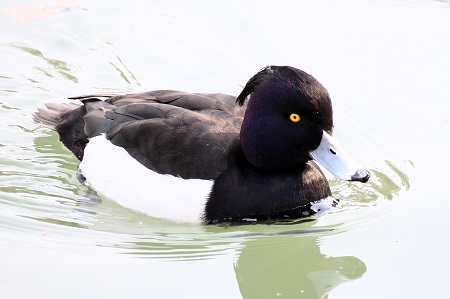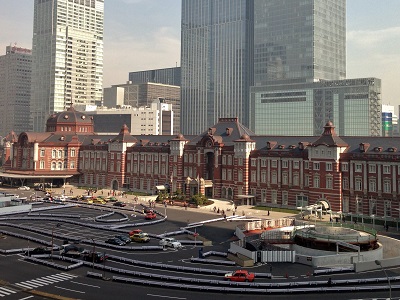I visited Rikugien Gardens to see biological impacts of Fukushima No.1 nuclear power plant accident. Though I have visited various places in Japan to see the health consequences of the accident, I have never found any effect against creatures in Japan.
Rikugien was established in 1702 by feudal lord Yanagisawa Yoshiyasu who was well-known for his literary accomplishments. Rikugien has been counted as one of two excellent gardens of the Edo period together with Koishikawa Korakuen. The garden was built by Mr. Yoshiyasu Yanagisawa, a famous favorite of the fifth Shogun Tunayoshi Tokugawa, as his villa in 1702. This garden is a typical Daimyo garden called a Kaiyuu pond garden with hills and ponds. Because the land had been on a corner of the flat Musashino, he dug a pond and made hills. The name, Rikugien, came from "six elements of Waka poems" that had been derived from "six styles of poems" written in the old Chinese poetry book "Mao-shi". In this garden, a big pond with some islands is surrounded by trees and offering imitations of famous Japanese beautiful spots such as Wakanoura in Kishuu(Wakayama Prefecture). The garden became the property of Iwasaki family of Mitsubishi group and was contributed to Tokyo city and opened to the public in 1938. Rikugien was appointed as special beauty spot of Japan in 1953. We can see various creatures living there too.
Generally speaking, animal's growth is so fast than human beings that they are more sensitive to radioactive materials of the environment than us. So I visited The Rikugien Gardens to see effects of the accident against creatures which are grown up by Japanese food and water. Fortunately, I could see them grown up safely and I couldn't find any impact of the accident. It seems that there is no problem for childbirth and child-rearing in Tokyo Japan.
Posted by Yoshitaka Kiriake from Japan on February 21, 2014.
東京都文京区の六義園では梅が美しい花を咲かせ、小鳥たちの歌声が響いていた。ツグミ、ハクセキレイ、キジバト、ムクドリ、ハシブトガラス、カルガモ、ヒヨドリ、キンクロハジロ、マガモ、ハシビロガモ、メジロ、シジュウカラ、スズメを観察できた。平成26年2月10日撮影。
Thrush
White wagtail
Rikugien Gardens
Google map
About Rikugien Gardens

Ume : Prunus mume
We can see various creatures at the garden.
Oriental Turtle Dove
White-cheeked Starling
Jungle Crow
Spot‐billed duck
Brown-eared bulbul
Tufted duck
Mallard duck
Northern Shoveler
Japanese white-eye
Japanese Tit
Sparrow
Trachemys scripta
Cat
Japanese foods are good and safe.
Because of stricter food safety law by Japanese government, we have no worry about foods.
Maccha : Powdered green tea
Yokan : Sweet jellied bean paste
Amazake : a sweet drink made from fermented rice
Wagashi : Japanese sweets
Sandwich
About 3 years have passed since Fukushima Daiichi nuclear power plant accident. I have visited various places of Japan to see the health consequence of the accident.
Fortunately I have never found any impacts by the accident among Japanese creatures. As far as I know, nobody has health problem which is caused by the accident in Japan.
Our Prime Minister Abe assures that "The situation is under control. The influence of the contaminated water is completely blocked within Fukushima. There are no health-related problems until now and there will never be health problems." He also said that "Tokyo is 250 kilometers away from Fukushima, and the kind of danger that you imagine does not exist in Tokyo. Tokyo is a very safe city."
As PM Abe said, Tokyo is very far away from Fukushima, people in Tokyo have no concern about the nuclear power plant accident. People in Tokyo have already forgotten the accident, because they think radioactive materials cannot reach there.
We know there is no problem for child birth and child rearing in Tokyo. So people in Tokyo are living without any concern about the accident.
I continue to visit various places in Japan to see the effects of the accident, because I can meet various creatures which are more sensitive to radioactive materials from the environment. It is important to see their health for our safety.
公衆衛生ネットワーク
Public Health Network in Japan






























































